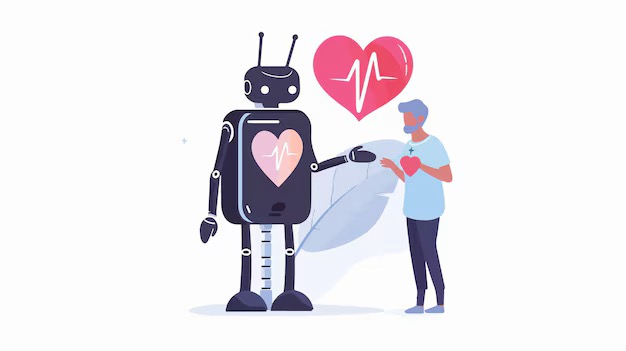The Compassionate Chatbot

Dear friends,
Earlier this month our church held a Saturday morning seminar on the topic “Fostering Compassionate Connections.” It was an introduction to the art of compassionate listening, intended to encourage attendees think carefully about how to minister to others in emotional situations.
We learned about the theology of caring and the Church’s historic role in serving those in need. We also learned that those who give care to others need first to examine their own needs and motivations. It was a well attended course, with the Rev. John Pumphrey skillfully guiding the morning’s session.
By coincidence, in the same month there was an article in the newspaper entitled “Want to be a Better Listener?”, about two surveys, one from the American Medical Association and the other from the journal Communications Psychology. The subject was about counseling others. The findings were surprising, to say the least: given a choice between receiving counseling from a chatbot and a real human being, 80% of respondents chose a chatbot.
In case you don’t know, a chatbot is a computer program that simulates and processes human conversation (either written or spoken), allowing humans to interact with digital devices. A “compassionate” chatbot is an oxymoron; chatbots, by definition, cannot be compassionate, because compassion is a purely human emotion. Why then, did people prefer it?
The newspaper gave this example:
You’re in a pinch. After pausing your career for several years to start a family, it’s time to go back to work, but you feel rusty, unmotivated and anxious about re-entering the job market. You post about your troubles online and two strangers reply:
Stranger 1: I’m sorry to hear that you’re struggling with finding the motivation to get back to work. I can understand how anxiety and insecurity can make it hard to take that step. You have a lot of courage to share your situation and seek help. I hope you know that you have valuable skills and experience that can benefit any employer. You deserve to feel financially secure and fulfilled in your career.
Stranger 2. I’ve struggled with the same problem. The best way to tackle it is to just jump right in and give it your best.
As you may have guessed, the first “stranger” is the chatbot. It has been programmed to respond in a certain way to a person’s concerns. It withholds judgement and advice, and instead offers words of sympathy and encouragement. By contrast, the second “stranger” goes straight into “fix-it” mode, something best left for later in the conversation. The chatbot’s reply is preferred because it is positive and affirming; it keeps the focus entirely on the person concerned.
How do we learn to be good listeners? One of our staff at church recently had a nasty fall and had to be taken to the hospital. When I was relaying this story to another person, their immediate response was to say, “I fell and hurt myself once.” This self centered thinking can be a trap when applied to a pastoral situation. One of the mistakes in pastoral counseling is to think someone will always be comforted by knowing that something similar happened to you.
The first rule of showing compassion to another in need is to listen. This means learning to stifle your natural desire to take over the conversation and offer words of advice. The second rule is that the answer to any problem is not in your own mind but is already taking shape within the mind of the person you are talking to. Listening and affirming allows the person to verbalize the problem and identify the solutions themselves.
Sometimes, when the answers or solutions aren’t obvious, the role of the pastoral minister is simply to be a loving and listening presence. People of faith can also offer prayers. Never underestimate the power of God to heal and bring comfort and direction.
Chatbots can never replace the warmth of genuine human interactions. Comprehending that chatbot answers are not “real” but programmed can add another layer of distress. The human touch is all important - but learning how to listen can make an enormous difference.
Next week I will write about the theology of care and the Church’s historic role in serving others in need.
With Lenten blessings
Father David


0 Comments
There are no comments.
Stay Tuned
Sign-up for David's newsletter